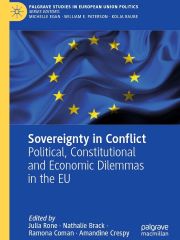About the book
This edited volume brings together leading international researchers in an attempt to disentangle and understand the multiple conflicts of sovereignty within the European polity in the aftermath of the 2008 economic crisis. While most research on sovereignty focuses on its international dimensions, what makes this volume distinctive is the focus on the mobilization of sovereignty discourses in national politics. Contrary to tired paradigms studying clashes between national and supranational sovereignty, the various chapters of the volume offer a provocation for the readers – what if these old vertical conflicts of sovereignty are increasingly complemented by horizontal conflicts between executives and parliaments at both the national and international level?
Conflicting Sovereignties and the Brexit State
Member states are organised for membership of the European Union. In contrast, the Brexit state will be a form of state organised for not being a member of the EU. It will need to do enough to recover sovereign control of the UK’s laws, borders and money to count as delivering on the 2016 referendum. It will need to review those parts of the UK political and legal order that depend on EU membership either discarding them or giving them some other foundation. It will need to decide between conflicting visions and ideologies of Brexit, as well as different ways of being a European democracy that is not a member of the EU. This chapter identifies four likely sovereignty conflicts within the British state. First between parliamentary and popular sovereignty. Second between constitutional and parliamentary sovereignty. Third between the sovereignty of the UK parliament and the sovereignty of the parliaments and peoples of the UK. Fourth, conflicts between a rejection implicit in important versions of Brexit of sovereignty pooling and a need to pool sovereignty to deal with externalities such as climate change, pandemics, mass migration, arms racing and a financial system free of systemic risk. Without some means of pooling sovereignty to deal with those and other externalities, democracies such as the UK will struggle to meet their most basic obligations to their own publics to secure rights, justice, welfare and democracy. Hence, even after Brexit—perhaps especially after Brexit—the external pooling of sovereignty is likely to remain a source of sovereignty conflicts within the UK. All four sovereignty conflicts might matter less if the Brexit state had more robust democratic procedures that are not themselves vulnerable to disagreement for resolving internal sovereignty disagreements.
Full info
Chapter 2: Conflicting Sovereignties and the Sustainability of the Brexit State
Christopher Lord
In: Sovereignty in Conflict. Political, Constitutional and Economic Dilemmas in the EU
Julia Rone, Nathalie Brack, Ramona Coman and Amandine Crespy (eds)
Palgrave Macmillan (2023)
ISBN: 978-3-031-27731-3
